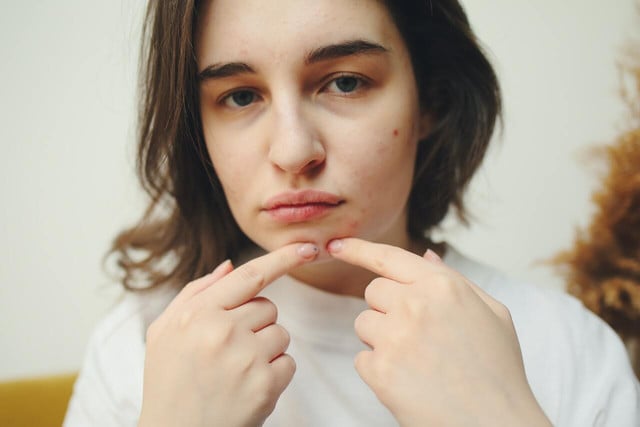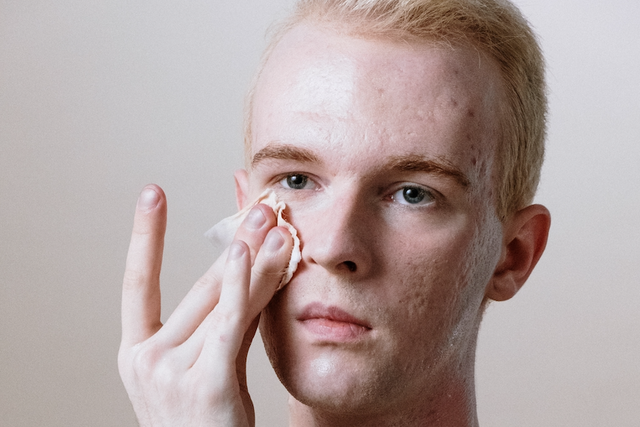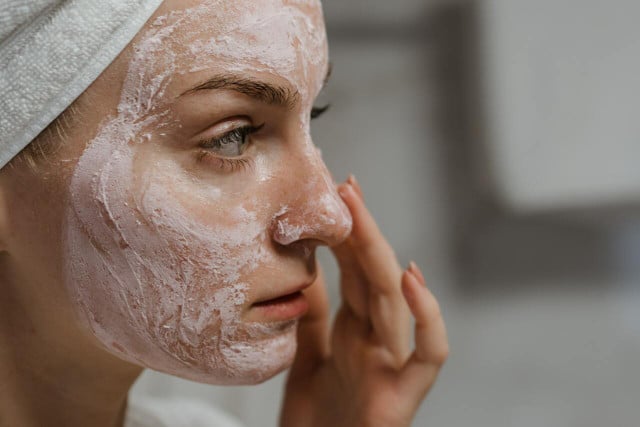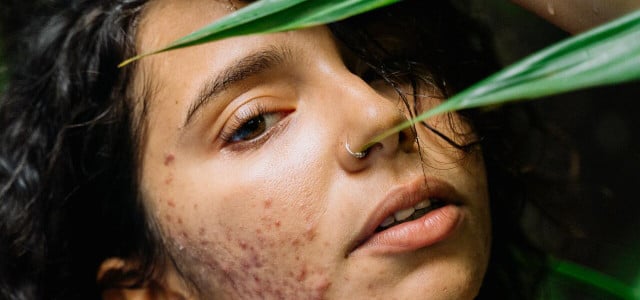Healing acne scars can be a long and tedious process. In this article, we’ll delve into how to remove your acne scars naturally and achieve a smoother skin texture.
As if acne isn’t bothersome enough, many acne-prone people tend to be left with scars later. These scars often look like little holes or bumps and are often caused by using the wrong blemish treatment. In this article, we’ll go over the causes of acne scars, how to remove acne scars naturally and how to prevent getting them in the future.
Where Do Acne Scars Come From?

Generally, acne scars come from inflamed acne blemishes. The contents of the blemished pore will sometimes spill into surrounding tissue and cause deeper scars.
The scars result from your skin producing collagen to heal the blemish. Sometimes your skin will produce too much collagen (resulting in raised scars) and sometimes too little (which means you’re left with small “holes” in your skin). This will often be accompanied by discoloration or even hyperpigmentation.
If you have acne, it is hard to predict whether or not you’ll be left with scars. According to the American Academy of Dermatology Association (AAD), these are the four types of people who are most likely to get acne scars:
- People with inflammatory acne, meaning swollen, red and painful blemishes that penetrate deep into the skin.
- People who wait too long to treat their inflammatory acne or do not address the issue.
- People who pick at their acne and pop pimples.
- People who have a blood relative with acne scars since it often runs in the family and genes play a predominant role.
Just because you fall into one (are all) of these categories doesn’t mean you will scar. Because of the unpredictable nature of acne scars, it makes sense to try to prevent scars as best as you can. However, if you already have acne scars, let’s dive into how to remove acne scars naturally.
How To Remove Acne Scars Naturally



First, it’s vital to know that healing acne and acne scars will take time. Be patient with your skin, and don’t overwhelm it with too many new products simultaneously. A usual skin cycle (the time in which your skin will completely renew itself) will take about six weeks. So if you want to judge a product’s efficiency, you should wait for six weeks.
In a quest for natural home remedies to heal acne scars, you’ll often find ingredients like apple cider vinegar, lemon juice or baking soda. These ingredients can be harsh and may aggravate your skin. Try to go for gentle, hydrating ingredients that will help to heal your acne scars instead:
- Honey is a super-ingredient that has antibacterial, wound-cleansing and wound-healing properties. One study concluded that all subjects showed positive effects when given honey to heal fresh traumatic or cutaneous wounds. The researchers point to honey’s ability to stop bacterial growth in tissues due to its acidic nature as one of the main reasons for the study’s success.
- While its mechanism in healing process is not clear yet, Aloe vera seems to also have wound-healing properties. In one study, Aloe vera was found to mitigate inflammation, increase wound contraction and decrease the size of scar tissue. If you’re interested in Aloe vera, peruse Aloe Vera Juice: Health Benefits and How to Make It.
- Rosehip seed oil has equally strong benefits for healing scar tissue. One study demonstrated rosehip seed oil’s ability to decrease redness and discoloration of scars, leading to a quicker recovery and better overall evolution. You could also try to incorporate rose hip tea into your daily routine.
- Staying within the theme of seed oils, black seed oil was shown to reduce papules and pustules after two months of therapy. Subjects claimed a 67% satisfaction rate which was made possible due to black seed oil’s antioxidant and anti-inflammatory effects.
If you feel like home remedies won’t do the trick for you anymore because your acne scars are too severe, consider trying one of these advanced methods to remove acne scars:
- Use a retinoid. Retinoid products have high vitamin A levels and increase your skin’s ability to boost collagen production. Collagen is necessary to plump your skin after a breakout, so retinoids may help in making your skin appear smoother. There are many different intensities of retinoid products, from over-the-counter to prescription-based. A gentle way to incorporate retinoids into your skincare routine is skin cycling, where you alternate between retinoid nights, exfoliation nights and recovery nights. Bear in mind that your acne might look worse for two weeks before it improves. You could also start by reading How Does Retinol Work? Little-Known Facts & Side Effects. Regardless of which method you choose be sure to consult your dermatologist before using retinoid products.
- Exfoliate regularly. Continuous exfoliation will remove dead skin cells and smooth the edges of your acne scars over time. It’s best to use a chemical exfoliant containing AHA or BHA instead of physical ones. You could try this vegan and cruelty-free BHA exfoliating toner by Paula’s Choice, also available on Amazon**.
- Use a Vitamin C product. This could be a serum or moisturizer containing Vitamin C, a proven ingredient to brighten the skin and even out the skin tone. Its antioxidant effect also further prevents inflammation and stimulates collagen production. Vitamin C is known to reduce hyperpigmentation and fade acne scars. It’s worth noting that these effects are only relevant when Vitamin C is directly applied to the skin, not if you eat it.
- Do regular face massages. Once your acne is fully healed and you’re left with scars, you could try to incorporate face massages into your morning routine. Face massages not only help to stimulate blood flow and improve circulation, but they help dissolve collagen clumps that are sticking together. This helps to loosen the scar tissue and give you smoother skin texture instead. If you want to find out more, read Don’t Miss Out On These 8 Face Massage Benefits.
How To Prevent Acne Scars



We already talked about the unpredictable nature of acne scars. But there are a couple of ways to minimize the likelihood of developing acne scars:
- The most important way to prevent acne scars is to stop picking your skin. It spreads bacteria and increases inflammation, increasing the likelihood of scarring. Instead, apply spot treatments to your blemishes and leave them alone. If you struggle with not picking at your skin, avoid harsh light and instead use a candle in your bathroom while you do your skincare routine. That way, you won’t see your blemishes while you do your cozy nighttime routine.
- Wear sunscreen every day. A blemish healing is your skin producing fresh new skin cells. These new skin cells and acne scars need protection since they are not used to being exposed to the sun yet. Unprotected contact with the sun will cause hyperpigmentation, which is exactly what you want to avoid. Use a UVA & UVB sunscreen everyday with SPF 50+, also when you’re inside. If you’re unsure what sunscreen to buy, read Chemical vs. Physical Sunscreen: What’s the Difference and Which Should You Choose?.
- Use a retinoid. As mentioned above, retinoids boost your skin’s collagen production and also help to prevent acne in the first place. That’s mainly because it removes the top layer of your skin, accelerating the skin’s healing process and preventing clogged pores.
Read more:
- Glycerin for Skin: 3 Benefits, the Risks & DIY Instructions
- 6 Homemade Leave-in Conditioners Using Natural Ingredients
- Back Acne: Treatment, Causes and Symptoms
Do you like this post?







